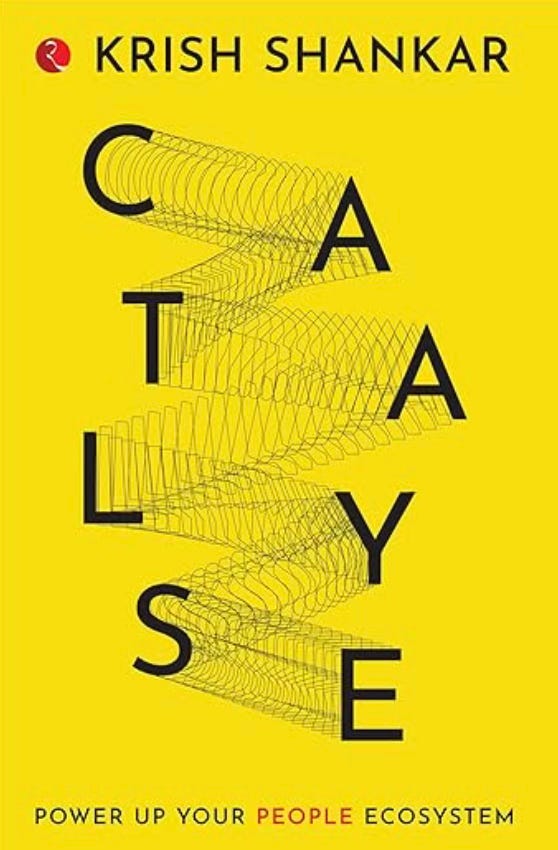Dear Uplevelers,
While we are already 50 days into 2025, we wanted to revisit a very interesting chat we had with Krish Shankar a while back, who was then Group Head HR, Infosys & in the past had led HR teams in behemoths like Philips (for the India Sub-continent), Bharti Airtel, Unilever etc. If you’re feeling video-ish today, feel free to watch this chat below!
Leadership Insights from a Veteran HR Professional
While it was a wide-ranging conversation, Krish Shankar is not just a veteran HR professional, but he’s also the author of the book "Catalyze" & he openly shares his insights on modern HR practices, talent management, and organizational culture. Drawing from his extensive experience at companies like Infosys and Unilever, Shankar offers practical frameworks and approaches for both established organizations and startups.
The Journey to "Catalyze"
What started as an idea to write about workplace emotions evolved into something broader when Gopalakrishnan, vice chairman of Tata Sons, connected Shankar with a publisher interested in an HR book. During the pandemic in 2020, Shankar found the time and flow to write, completing roughly one chapter per weekend.
"The book aims to make HR more contemporary and take practical aspects of HR to both business people and HR leaders," explains Krish. "It's meant for a larger audience, not only for HR professionals but for business leaders, bringing more contemporary ideas to HR while looking at best practices from my experience and conversations with many CHROs and CEOs."
Pride in People Development
When asked about his career achievements, Shankar points to the growth of people who have worked with him. "I can count many CHROs or senior people in different companies who've all worked together. It's not because of my influence, but just that some have worked with me, some have been part of my teams, and I've seen them grow and take on bigger roles. That gives me the greatest satisfaction."
He cites examples from his time at Unilever, where professionals from various countries - Singapore, China, Vietnam, South Africa, and Sri Lanka - have gone on to become CHROs at major companies.
The Jobs-to-be-Done Framework
Krish emphasizes the importance of the Jobs-to-be-Done framework, popularized by Clayton Christensen, in HR practices. "At the heart of it is finding out what really needs to be done and what is the job that needs to be done, and then decide how you want to do it," he explains.
This approach helps organizations focus on outcomes rather than getting caught up in functional silos within HR, where different departments like recruitment and compensation might work at cross-purposes.
The SBEM Framework for Talent
Shankar introduces the SBEM framework for evaluating talent:
- Skills: What someone should be able to do
- Behaviors: Desired competencies and actions
- Experiences: Relevant background that builds foundation
- Mindset: Particularly important for mid-career and senior roles
"As you go higher, the skills become less important," notes Shankar. "What becomes more important are the behaviors, the mindset, and the experiences."
Culture as a Strategic Element
On organizational culture, Shankar advocates for viewing it through two distinct lenses:
1. Strategic Elements: Behaviors that help companies succeed or differentiate in the market. For example:
- Walmart emphasizes frugality and cost-consciousness
- Amazon focuses on innovation and customer-focused innovation
2. Universal Behaviors: Common elements across companies like respect, integrity, and inclusion.
"The behavior and human part is non-negotiable and actually similar across all companies," Krish explains. "But the difference is how companies make it come alive."
Effective Culture Implementation
Krish outlines four key elements for implementing culture:
Clear description of desired culture
Leadership commitment and alignment
Social architecture (middle manager training, recognition, performance evaluation)
Continuous measurement and feedback
For large organizations operating across multiple countries, Krish acknowledges the challenge of scale but emphasizes the importance of maintaining non-negotiable elements while allowing for local variations in softer cultural elements.
The Role of Emotion in the Workplace
Krish distinguishes between popular notions of emotion (individual mood swings) and collective emotions that drive organizational success. "Collective emotions are a great source of getting things done," he explains. "If you want to grow a company and make people take ambitious targets, you need to have collective emotions like optimism and pride."
He cites recognition as an example where emotions play a crucial role: "If pride and gratitude come along with recognition, then it becomes true recognition. Otherwise, it's just one more paper that people will forget."
Advice for Startup Founders
For startup founders looking to implement HR best practices, Krish recommends:
1. Start with understanding the jobs to be done at both company and people levels
2. Identify 2-3 foundational outcomes that matter most:
- Attracting and building talent
- Building culture
- Training and capability development
- Ensuring competitive cost structure
- Focus on execution
The Catalyst Approach
Throughout the conversation, Krish emphasizes the shift from viewing HR as a resource management function to seeing it as a catalyst for organizational change and growth. This evolution reflects the increasing recognition of people as a crucial source of value rather than just another resource to be managed.
The term "catalyst" itself speaks to HR's role in accelerating positive change while remaining distinct from the core reaction - much like a chemical catalyst speeds up reactions without being consumed in the process. This metaphor captures the essential role of modern HR: enabling and accelerating organizational success through strategic people practices.
As organizations continue to evolve in response to changing workplace dynamics, technological advancement, and shifting employee expectations, we chose this SmartCast since Krish's insights offer a valuable framework for both HR professionals and business leaders looking to build more effective, human-centric organizations.
We hope you liked this newsletter and if you wish to uplevel
Yourself: Watch our YouTube Playlist & join CTQ Compounds.
Your Team: See our Case Studies & connect with us



